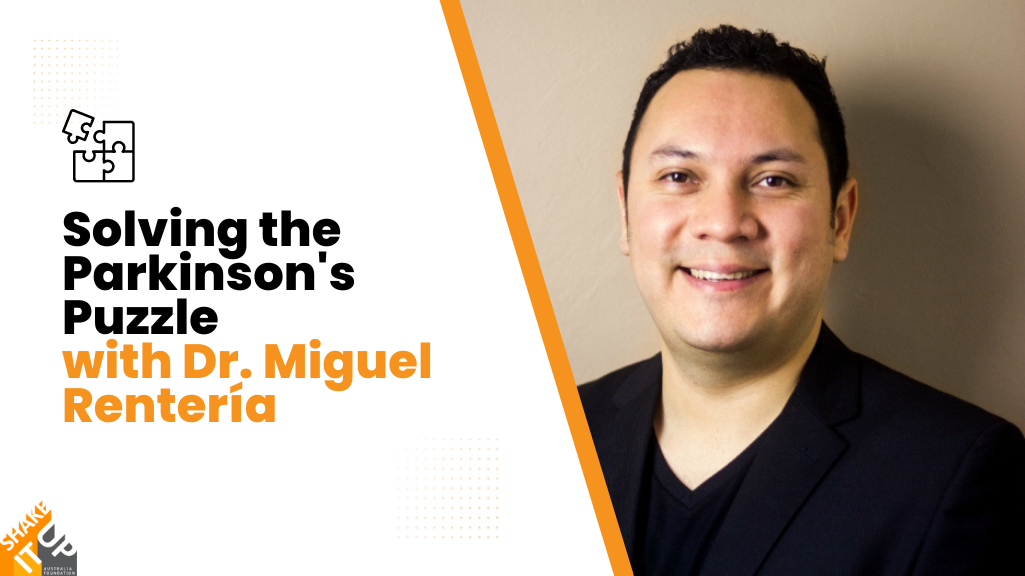
In this chat with Associate Professor Miguel Rentería, we hear about the Australian Parkinson’s Genetics Study, and how the study of genes is helping to crack the Parkinson’s code.
Over 200,000 Australians are currently living with Parkinson’s disease, with a further 38 diagnosed everyday. It’s the fastest growing neurological disorder in the world, and there is still no cure. In our ‘Solving the Parkinson’s Puzzle’ series, we are speaking to leading Australian researchers to find out how their work is helping to slow, stop and ultimately cure Parkinson’s disease.
Miguel, can you tell us about your role and research focus?
I’m the head of the Computational Neurogenomics Lab in the Mental Health & Neuroscience Program at the QIMR Berghofer Medical Research Institute in Brisbane. I’m also the principal investigator of the Australian Parkinson’s Genetics Study, which is a nation-wide effort to characterise the basis of Parkinson’s disease in the Australian population.
My research group and I are interested in understanding three key research questions:
- Why do some people develop Parkinson’s, and other’s don’t?
- What is the role of genetics and it’s interaction with environment and lifestyle?
- Why are people’s symptoms and rate of progression so different?
How is your work helping to solve the Parkinson’s puzzle?
Genes are like tiny instructions in our DNA that tell our bodies how to work. So, as a scientist, I want to figure out which genes are responsible for certain things. Like, why some people have blue eyes or dark hair. Or why some people get Parkinson’s, while other’s don’t. This is what we call gene mapping – it’s just a way to build a map to find hidden treasures, which are the genes which explain these differences. We have to study many, many people to see if there are any patterns.
To do that, we use special tools to analyse the information and figure out which genes are connected to which characteristics.
How can I get involved?
At the moment, we are still in the recruitment phase of our study. Thanks to the enthusiastic and generous contribution from thousands of volunteers around Australia, we have more than 7,000 participants today. But, we want to recruit 20,000 in total! 10,000 with a Parkinson’s diagnosis, and 10,000 without Parkinson’s.
Participation in the study involves:
- Completing an online or paper questionnaire
- Donating a saliva sample
From there, we can extract DNA and characterise the participant’s genetic profile. It’s very simple! You can find out more here.
What’s the next phase of your research?
The next stage will involve analysing the data using statistical models and powerful computers. From this we can understand which genes are linked to Parkinson’s disease, and how they influence people’s susceptibility or the difference in symptoms and progression of the disease.
What will your research mean for someone with Parkinson’s in 10 years’ time?
For someone wondering “why participate in research?”, let’s imagine what we can achieve in the next 10 years. The knowledge that our project will generate will enable us and other scientists to pinpoint genes that can be therapeutic targets, so we can develop new strategies and therapies to slow down, stop and eventually prevent and cure the disease.
I believe that we are really at a tipping point. In the next 10 years we will see tremendous progress regarding new therapies for Parkinson’s.
How has the funding from Shake It Up helped to make your research a reality?
Our research would not be possible without Shake It Up. It has helped us to go from a small, pilot study to a large, nation-wide study. We are very grateful for their support, and not just in terms of funding. Shake It Up has been an active partner in our project, so the impact, reach and outcomes of this project have been greatly enhanced by the collaboration.
Thank you to Shake It Up Australia, and thank you to all the participants in our study. Together, we can defeat Parkinson’s.
Dr. Miguel Renteria from @QIMRBerghofer says the knowledge the APGS will generate will enable scientists to pinpoint genes that can be therapeutic targets, so we can develop new strategies to slow down, stop and cure #Parkinsons. Click To TweetThe Australian Parkinson’s Genetics Study will contribute towards the largest study of Parkinson’s genetics ever undertaken, the Global Parkinson’s Genetics Program (GP2), and is funded by Shake It Up Australia and The Michael J. Fox Foundation for Parkinson’s Research. You can find out more or register to participate here.
Video produced by Veritas Events


